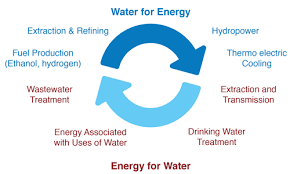Legal and Policy Aspects of the Water-Energy Nexus
Modern systems of water and energy are tightly intertwined. Significant amounts of water are expended during the phases of energy production, from resource extraction to final generation. In turn, energy powers the equipment that extracts groundwater or surface water, purifies water to the  standards required for human consumption, pumps water to our communities and businesses, and finally treats wastewater before releasing it to the environment. That relationship was the focus of a joint meeting held here at Marquette University earlier this month between The Water Council and the Mid-west Energy Research Consortium. The two organizations plan to design a joint roadmap to advance local efforts, including academic research, in the “energy-water nexus.”
standards required for human consumption, pumps water to our communities and businesses, and finally treats wastewater before releasing it to the environment. That relationship was the focus of a joint meeting held here at Marquette University earlier this month between The Water Council and the Mid-west Energy Research Consortium. The two organizations plan to design a joint roadmap to advance local efforts, including academic research, in the “energy-water nexus.”
To date, significantly less attention has been paid to the legal and policy aspects of this “nexus.” Policy strategies surrounding the “nexus” have generally focused on efficiency measures to limit demand for both water and energy, especially in sectors that use both such as agriculture and power generation. More innovation solutions might include sustainability index measurements, pricing corrections, and alternative decisional frameworks that include broader groups of stakeholders.
The conceptual “nexus” model is not without its critics, however.

 pact of excess salt on shoes, clothes, and vehicles.
pact of excess salt on shoes, clothes, and vehicles.